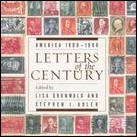Books: Letters of the Century: America 1900-1999
 Why I am recommending this book:
Why I am recommending this book:
This collection of letters written during the Twentieth Century is a great book to add to your collection. Some sad, some touching, some funny - each letter offers a glimpse into an aspect of life, once upon a time. This book promises to inform as well as to inspire.
Click here to purchase this book.Amazon.com:
Leaving few stones unturned, the husband-and-wife journalist team of Grunwald and Adler (a former Esquire features editor and a Wall Street Journal assistant managing editor, respectively) have compiled a riveting epistolary chronicle of 20th-century America. Comprising 423 letters that are by turns intimate, bureaucratic, officious and epoch-defining, the book is divided by decades, and each chapter opens with a list of salient facts of the period, to give context. Ranging widely in subject and tone, the letters offer remarkable glimpses of various facets of American life. There's a missive from Carl van Vechten to Theodore Dreiser explaining how to acquire liquor during Prohibition (dial a certain number, refer to vodka as "white" and whiskey as "gold"); a letter from a Vietnam soldier named Dusty distraught over having killed a nine-year-old grenade-wielding girl; and from the Starr Report" a letter from an FBI examiner to the FBI declaring the semen on Monica's infamous blue dress to be Bill Clinton's. Some letters are extremely personal: there's a message from Ethel Rosenberg to her children, Jacqueline Kennedy's thank you note to Lyndon Johnson written the day after her husband's funeral, and a "coming-out" letter from a gay businessman to his parents. Others are of great public significance: Franklin D. Roosevelt's dispatch to His Imperial Majesty the Emperor of Japan, dated December 6, 1941, in which the president pleads with Hirohito to cease his belligerent activities (and of which FDR told his wife: "This son of man has just sent his final message to the son of God"); and John F. Kennedy's plea for rescue, written on a coconut, from the island to which he'd swam when his PT boat went down. Others, such as the exchange between the Ford Motor Company and Marianne Moore, are delightfully funny. Asked to suggest names for a new car, the poet responds, in a series of three letters, with such ideas as "Bullet Lavolta," "Mongoose Civique" and "Utopian Turtletop," only to be told, some time later, that the company has chosen a different name, one with "gaiety and zest"Athe Edsel. "Surprisingly few" letters, write Grunwald and Adler, "contain truly famous lines." An exception they note is Lillian Hellman's dramatic, much-quoted letter to HUAC refusing to "cut my conscience to fit this year's fashion." The absence of celebrated lines, however, is not missed: aphorisms, after all, have a closed, independent quality, at odds with many of the engaging, profoundly revealing letters found in this volume. The reader is often too deep in dialogue with the voices emerging from these pages to miss anything that might have wished simply to be admired on its own.
Click here to purchase this book.
